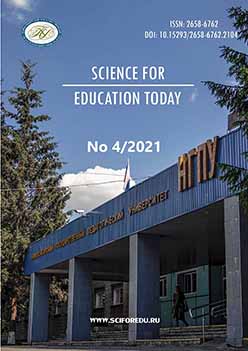The structure of academic writer identity in L2 book reviews by Russian undergraduates: Voice and stance
The structure of academic writer identity in L2 book reviews by Russian undergraduates: Voice and stance
Author(s): Tatiana Borisovna AlenkinaSubject(s): Higher Education , Educational Psychology, Sociology of Education
Published by: Новосибирский государственный педагогический университет
Keywords: Writer identity; Book review; Voice; Stance; Positioning; Negative value; Booster;
Summary/Abstract: The article focuses on theoretical and practical aspects of academic writer identity. The theoretical aspect comprises the analysis of the Anglo-American bulk of research devoted to the problem of writer identity in the academic written discourse. The purpose of the article is to define the structure of writer identity, its voice and stance. The practical objective of the study is to investigate the identity of novice academic writers represented in their language choices as well as to describe the mechanism of such choices. In order to accomplish the purpose of the research, three types of writer positioning are distinguished: ideational, interpersonal, and textual. Materials and Methods. The theoretical analysis is based on the Systemic Functional Linguistics (SFL) approach and Rhetorical Genre Studies as well as recent developments of ESP. The analysis of empirical data has been conducted using the methods of discourse analysis as well as qualitative and quantitative methods of data processing. The study reveals the voice and stance represented by lexico-grammatical means of the English academic written discourse. The conducted experiment introduces the context of ESP and models the situation of the implementation of the genre approach in the Academic Writing course in the Moscow Institute of Physics and Technology, which is one of the leading technical universities in Russia. The research materials include texts of academic book reviews written in English by Russian undergraduates. Results. The study has revealed the social nature of writer identity determined by the genre hybridity of a book review. It is shown that identification and positioning are in direсt connection with the source text; thus, while choosing a textbook or a general science book, the writer identity is getting to be collective or professional. Depending on the functional style of the source text, the rhetorical markers are changing as well. Thus, while choosing a textbook, students are writing for the teacher and addresses the student audience; at the same time in case of the general science text, the student rises to the level of an expert and addresses the scientific community. The popular science text helps work out the individual voice while the author’s style is changing toward the creative one and the dialogue between the writer and the reader is taking an intimate coloring. Subjectivity markers (adjectives with the negative value, boosters) are getting to be typical for the Russian linguistic and academic culture. Conclusions. The article concludes that constructing the socially-predetermined writer identity is an essential skill for students and academics. The writer identity is fluid and changeable depending on the social context – academic discourse and genre characteristics. The genre of a book review that combines objectivity and subjectivity gives an opportunity to construct writer identity according to the choice of the source text. The writer identity is culturally-predetermined and connected with the standards of Russian linguistic culture, academic rules and traditions of teaching English as a foreign language in Russia.
Journal: Science for Education Today
- Issue Year: 11/2021
- Issue No: 4
- Page Range: 156-169
- Page Count: 14
- Language: English

